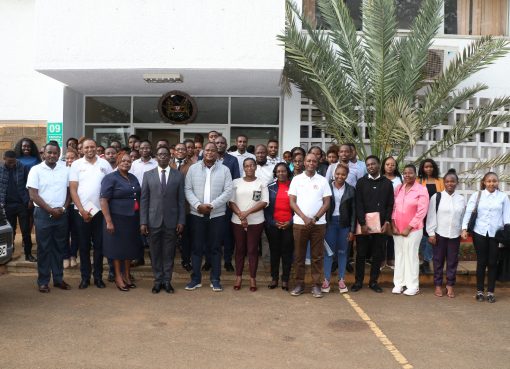The Kenya Revenue Authority (KRA) is implementing strategic measures to ensure that there is sustainable revenue collection by modernising its operations, a move which will see them meet revenue targets.
KRA Commissioner General Humphrey Wattanga said that they have established a strong foundation for sustainable revenue collection as shown by their consistent growth trajectory.
“Our revenue collection has revealed remarkable resilience growing from Sh1.58 trillion in the Financial Year (FY) 2018/2019 to Sh2.407 trillion in the FY 2023/2024 which marks a significant 11.1% growth rate,” said Wattanga.
He highlighted that they have implemented several strategic initiatives to ensure that they maintain a steady momentum in revenue collection which include leveraging on disruptive technology to deliver tools that enable market-customized solutions.
According to Wattanga, these solutions have highly simplified tax processes, facilitated trade and enhanced voluntary compliance.
“KRA has developed and launched ‘GAVA Connect,’ an innovative Application Programming Interface (API) platform designed to empower Information Technology (IT) developers and young Kenyan techies to create home-grown solutions that address local needs,” he said.
The Commissioner General disclosed that these solutions will enable businesses and taxpayers to seamlessly and securely integrate with KRA’s key processes, fostering tax simplification and driving voluntary compliance.
He added that they are also implementing the ‘tax-at-source technology’ that enables KRA to integrate with other systems allowing for an almost real-time collection of information and revenue directly at the source.
Wattanga said that some of the initiatives under this programme that KRA has implemented include, Electronic Tax Invoice Management System (eTIMS), which has minimised Value Added Tax (VAT) fraud and increased tax revenue.
The programme has also enabled KRA to integrate Betting and Gaming Companies into the KRA tax system giving KRA real-time access to companies in the gaming and betting sector.
This saw the sector register a revenue growth rate of 26.2% after KRA collected Sh24.269 billion in the FY 2023/24 compared to Sh19.224 billion in the previous year from Excise on betting services, Withholding Tax (WHT) on winnings from betting and gaming and betting tax.
“We also have programmes that are aimed at streamlining trade facilitation processes and enhancing customer support programmes. The adoption of Pre-Arrival Cargo Processing, integration with Kenya Trade Network Agency (KenTrade’s) Trade Facilitation Platform, enhanced customs systems and exchange of information have also improved trade facilitation,” he said.
Wattanga said that the efficiency-enhancing measures effected by KRA resulted in a 4.9% increase in customs revenue to Sh791.368 billion during FY 2023/2024 compared to the same period in FY 2022/2023.
On the Tax Base Expansion (TBE), which aims to onboard taxpayers previously not paying taxes, Wattanga said that some of the initiatives include recruitment of landlords under the Monthly Rental Income (MRI) programme through a taxpayer mapping process (Block Management System – BMS).
“One of the initiatives under KRA’s tax base expansion programme is netting the informal sector, the majority of whom are the Micro, Small and Medium Enterprises (MSMEs). KRA is determined to grow the taxpayer base by a further four million to 13 million active taxpayers by FY 2028/2029 through tailored support frameworks that bolster tax compliance of dynamic sectors such as the digital economy, agribusiness, and the MSMEs,” said Wattanga.
With regard to whether the Kenyan citizenry is overtaxed, Wattanga said that empirical data suggests the contrary.
“Despite past efforts to enhance revenue, Kenya’s revenue yield remains below the East African Community (EAC) target of 25% of Gross Domestic Product (GDP). We need to enhance ordinary revenue collection as a share of GDP from 14% to 22% and increase the compliance rate from 70% to 90% by the end of FY 2026/2027,” he said.
He added that they have implemented various initiatives to aid dispute resolution and debt collection, and this has significantly reduced taxpayers’ debt portfolio by over Sh100 billion in the last financial year.
“Through technology, we are working on enhancing taxpayer experience by simplifying tax payment processes and ensuring a positive experience. This will help foster tax simplification and promote voluntary compliance,” said Wattanga.
By Joseph Ng’ang’a





